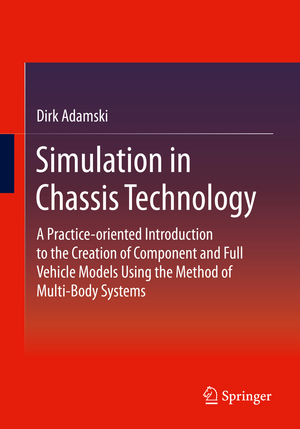Simulation in Chassis Technology: A Practice-oriented Introduction to the Creation of Component and Full Vehicle Models Using the Method of Multi-Body Systems
Autor Dirk Adamskien Limba Engleză Paperback – 23 oct 2020
Preț: 389.70 lei
Nou
Puncte Express: 585
Preț estimativ în valută:
74.57€ • 79.74$ • 62.17£
74.57€ • 79.74$ • 62.17£
Carte disponibilă
Livrare economică 27 martie-10 aprilie
Preluare comenzi: 021 569.72.76
Specificații
ISBN-13: 9783658306779
ISBN-10: 3658306777
Pagini: 287
Ilustrații: XX, 287 p. 188 illus., 69 illus. in color.
Dimensiuni: 168 x 240 mm
Greutate: 0.45 kg
Ediția:1st ed. 2021
Editura: Springer Fachmedien Wiesbaden
Colecția Springer
Locul publicării:Wiesbaden, Germany
ISBN-10: 3658306777
Pagini: 287
Ilustrații: XX, 287 p. 188 illus., 69 illus. in color.
Dimensiuni: 168 x 240 mm
Greutate: 0.45 kg
Ediția:1st ed. 2021
Editura: Springer Fachmedien Wiesbaden
Colecția Springer
Locul publicării:Wiesbaden, Germany
Cuprins
Part I: Introduction to Simulation.- 1. Simulation Methods.- 2. Systems Engineering.- 3. Modeling.- 4. Numerical Analysis: The Problem with the Beginning.- 5. Simulation Tools.- 6. Simulation Process.- Part II: Simulation in Chassis Technology.- 7. Modeling of Chassis Components.- 8. Kinematics and Compliance.- 9. Springs.- 10. Damping and Friction.- 11. Steering.- 12. Tires and Roads.- 13. Drive Train.- 14. Brake System.- 15. Vehicle Body.- 16. The Simulated Driver.- 17. The Vehicle Model as a Controlled System.
Notă biografică
Prof. Dr.-Ing. Dirk Adamski worked in the passenger car development department of Daimler AG as a test and computational engineer. Since 2009, he has been Professor for Testing and Simulation in Chassis at the University of Applied Sciences in Hamburg.
Textul de pe ultima copertă
Anyone who wants to simulate the behavior of vehicles must think about how they want to model the vehicle's chassis. Depending on the question (vehicle dynamics, ride comfort, load data prediction ...) there are a variety of possibilities. This book should help to find and implement the right models and processes. In addition to a short introduction to simulation technology, the most important types of modelling for the assemblies of the chassis using the method of multi-body systems are presented. However, successful simulation does not only mean the assembly of suitable models, but always represents a well thought-out process that goes from data acquisition to the validation of the models. This will be discussed using suitable examples for concrete questions.
This book is a translation of the original German edition “Simulation in der Fahrwerktechnik” by “Dirk Adamski”, published by Springer Fachmedien Wiesbaden in 2014. The translation was done with the help of artificial intelligence (machine translation by the service DeepL.com). A subsequent human revision was done primarily in terms of content, so that the book will read stylistically different from a conventional translation. Springer Nature works continuously to further the development of tools for the production of books and on the related technologies to support the authors.
The Content
Introduction to Simulation: Simulation Methods - Systems Engineering - Modeling - Numerical Analysis - Simulation Process. - Simulation in Chassis Technology: Modeling of Chassis Components - Kinematics and Compliance - Springs - Damping and Friction - Steering - Tires and Roads - Drive Train - Brake System - Vehicle Body - The Simulated Driver - The Vehicle Model as a Controlled System
The Target Groups
About the Author
Prof. Dr.-Ing. Dirk Adamski worked in the passenger car development department of Daimler AG as a test and computational engineer. Since 2009, he has been Professor for Testing and Simulation in Chassis at the University of Applied Sciences in Hamburg.
This book is a translation of the original German edition “Simulation in der Fahrwerktechnik” by “Dirk Adamski”, published by Springer Fachmedien Wiesbaden in 2014. The translation was done with the help of artificial intelligence (machine translation by the service DeepL.com). A subsequent human revision was done primarily in terms of content, so that the book will read stylistically different from a conventional translation. Springer Nature works continuously to further the development of tools for the production of books and on the related technologies to support the authors.
The Content
Introduction to Simulation: Simulation Methods - Systems Engineering - Modeling - Numerical Analysis - Simulation Process. - Simulation in Chassis Technology: Modeling of Chassis Components - Kinematics and Compliance - Springs - Damping and Friction - Steering - Tires and Roads - Drive Train - Brake System - Vehicle Body - The Simulated Driver - The Vehicle Model as a Controlled System
The Target Groups
- Beginners, but also experienced vehicle simulation engineers who need to use or extend an existing or newly acquired simulation environment
- Decision makers who need to set up a simulation process or purchase a simulation environment or want to understand what their calculators are doing
About the Author
Prof. Dr.-Ing. Dirk Adamski worked in the passenger car development department of Daimler AG as a test and computational engineer. Since 2009, he has been Professor for Testing and Simulation in Chassis at the University of Applied Sciences in Hamburg.
Caracteristici
Safe vehicle simulation with suitable vehicle models Modelling types for suspension kinematics, springs and dampers explained in detail Data acquisition and validation of vehicle models
